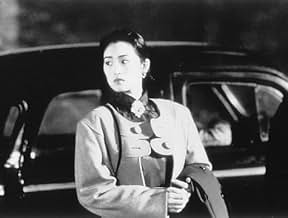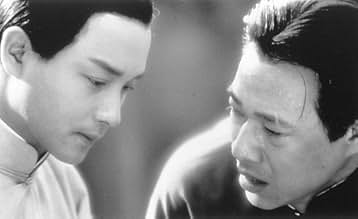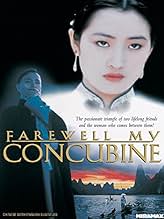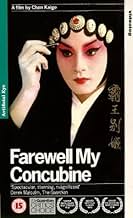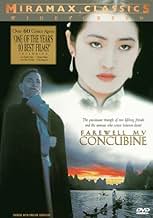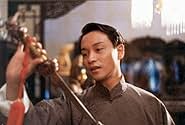CALIFICACIÓN DE IMDb
8.1/10
36 k
TU CALIFICACIÓN
En 1924, dos niños se conocen en una escuela de formación de ópera en Pekín. Forjarán una amistad de casi 70 años y vivirán una de las épocas más convulsas de la historia de China.En 1924, dos niños se conocen en una escuela de formación de ópera en Pekín. Forjarán una amistad de casi 70 años y vivirán una de las épocas más convulsas de la historia de China.En 1924, dos niños se conocen en una escuela de formación de ópera en Pekín. Forjarán una amistad de casi 70 años y vivirán una de las épocas más convulsas de la historia de China.
- Nominado a 2 premios Óscar
- 24 premios ganados y 12 nominaciones en total
Zhenxiang Fei
- Shitou as a Child
- (as Yang Fei)
Opiniones destacadas
As far as story and content goes this owes more than a little to The Last Emperor (1987), which is not surprising since Director Kaige Chen was a member of the cast of that film and no doubt was influenced by its success. But stylistically, and especially as the film was directed and cut, "Farewell, My Concubine" is original and stands alone. If The Last Emperor was a Western movie about the Chinese political experience in the Twentieth Century, then Farewell, My Concubine is a Chinese movie, influenced by the West, about that same experience. While the former focused on the emperor and those around him, "Farewell..." focuses on two actors of the Beijing opera. Admittedly, "Farewell..." is long (I saw the 157-minute version) and sometimes strays from it intent, but gains and maintains power and keeps our interest mainly because everything is presented in a starkly-lit, intensely focused manner. The epic-like story itself is good if a little pedestrian at times. The lavish and stunning sets in opulent color and design, are just fascinating to view. Everything from the extras in the crowds to the porcelain for tea is carefully chosen and presented. Particularly striking are the traditional costumes and makeup, shown to advantage through the fine camera work. But what makes the film is the glimpse we get of the world of the Beijing opera and its traditions. From the Dickensian boy's school for the actors to the intrigues with patrons and the political powers that be, there's the sense of a world beyond our experience. The acting was also excellent. The beautiful Gong Li, who played Duan's wife was captivating as she displayed a wide range of emotion. Leslie Cheung as Dieyi, "the concubine," and Fengyi Zhang as Duan, "the king," were also excellent. The boys who played the actors as children, especially the actor who played Douzi, were first rate.
I've seen this movie more times than I can count and I cry every time. I first saw it in the theater in 1993 and I was rooting for it to win Best Foreign Film Oscar, but it lost to the far inferior Belle Epoque (Spain). As to the person who wrote that this film made Cheng Dieyi seem like he was made to be gay because of abuse, I think you need to take another look. To my mind, Dieyi seemed to be infatuated with Shitzou as soon as he got there. However you look at it, this is a film that has great performances all around. I especially loved Leslie Cheung as the adult Cheng Dieyi (requiem eternem Leslie, 1956-2003), not to mention Gong Li. An excellent film, but be forewarned: it's almost three hours long. 10/10
I have seen this movie only once but it left an indelible impression on both me and my wife. It is a beautiful film with gorgeous photography, invisible direction and fantastic acting. What struck us most about this film was how many levels it had. It was a story about politics, love, life, faith, all rolled into one exceptional package. Yet none of these messages are hammered into you. They just flow over you in well-timed waves. Many of these Chinese movies are so interesting because of their unique perspective. It's wonderful to immerse yourself in a great film from a different culture. The many points of beauty in this movie are subtle, delicate and drenched in China's magnificent history. You have to experience it for yourself to understand, and once you do you'll fall in love with the world of Chinese cinema.
I have had a great deal of trouble writing this review. Every time I make a start I can find nothing to get my teeth into and no coherent thread to interconnect my thoughts. While there are many potential sub-topics they all seem to stand in isolation. While this may simply be a reflection of my inability to string two sentences together I think in this case it pretty accurately summarizes the issues I have with this movie.
It is difficult to figure out what this movie is and if asked to summarise it in 25 words or less I would be flummoxed. Is it a Chinese history movie? An opera movie? A Chinese culture lesson? A love story? A story of betrayal? A story of pseudo or actual homosexuality? It is snippets of all of these and probably more, but it does not really do justice to any of them. Basically it suffers from multiple personality disorder and unfortunately we don't get enough time with any of them to relate to any of them. Yes, the history and cultural aspects are interesting in their way but don't really add anything to our understanding of the horrors of the Japanese invasion of China, the Nationalist/Communist struggle, the early Communist era and the later Cultural Revolution. Yes, it is a "love story" between the two actors who play the King and the Concubine, but we never experience any passion or come anywhere close to connecting to either of these characters to really care. The "King" character in particular is very undeveloped, little more than a cardboard cut-out who happens to be the object of the "Concubine's" unrequited love. The character played by Gong Li is also skin deep and we never really care about her or her relationship with the "King" actor – indeed the random and non-sensical way in which these two characters become engaged simply nukes any credibility that this relationship might have had, and by extension destroys the credibility of any other relationship on the movie, most importantly the pivotal one between the "King" and the "Concubine". The betrayal, which I gather meant something personal to the director, is dealt with too curtly to have any effect at all. The character of the "son", raised from an abandoned baby, is totally illogical and we simply don't get to know him well enough to care about him or understand why he would possibly want to betray his adoptive parents. It all just seems facile and silly. We never really understand (or at least, I don't) the "homosexual" overtones of the "Concubine". Was he simply beaten into a form of insanity in which he thinks he is always in character as a woman? Is he actually a homosexual? His "king" friend seems to be too thick to understand the "Concubine's" feelings for him and this to me trivializes the whole "affair". And to be honest, none of the characters come across as being particularly nice, in fact the Concubine character comes across more as a petty, whinny, jealous, lightweight flake than a tragic figure we could weep for.
OK, just because a film is not perfect doesn't mean you should not watch it. "Farewell My Concubine" is one of those films which is a "must see" despite its failings. If it falters as an emotionally satisfying and coherent movie it is a stunning technical tour de force and a masterpiece of its kind. Just to have made a movie of this scope is an achievement, almost to the point that its success is secondary, crazy as that may sound. It is a movie of such breadth that it is impossible to take in completely in one sitting, and that is perhaps the ultimate test – you know you need to see it again to understand it but can you care enough about it to make that effort? But – trust me - you need to see this movie – your education as a movie goer is incomplete unless you do. You will enjoy it, and you will be moved to have an opinion, one way or the other.
It is difficult to figure out what this movie is and if asked to summarise it in 25 words or less I would be flummoxed. Is it a Chinese history movie? An opera movie? A Chinese culture lesson? A love story? A story of betrayal? A story of pseudo or actual homosexuality? It is snippets of all of these and probably more, but it does not really do justice to any of them. Basically it suffers from multiple personality disorder and unfortunately we don't get enough time with any of them to relate to any of them. Yes, the history and cultural aspects are interesting in their way but don't really add anything to our understanding of the horrors of the Japanese invasion of China, the Nationalist/Communist struggle, the early Communist era and the later Cultural Revolution. Yes, it is a "love story" between the two actors who play the King and the Concubine, but we never experience any passion or come anywhere close to connecting to either of these characters to really care. The "King" character in particular is very undeveloped, little more than a cardboard cut-out who happens to be the object of the "Concubine's" unrequited love. The character played by Gong Li is also skin deep and we never really care about her or her relationship with the "King" actor – indeed the random and non-sensical way in which these two characters become engaged simply nukes any credibility that this relationship might have had, and by extension destroys the credibility of any other relationship on the movie, most importantly the pivotal one between the "King" and the "Concubine". The betrayal, which I gather meant something personal to the director, is dealt with too curtly to have any effect at all. The character of the "son", raised from an abandoned baby, is totally illogical and we simply don't get to know him well enough to care about him or understand why he would possibly want to betray his adoptive parents. It all just seems facile and silly. We never really understand (or at least, I don't) the "homosexual" overtones of the "Concubine". Was he simply beaten into a form of insanity in which he thinks he is always in character as a woman? Is he actually a homosexual? His "king" friend seems to be too thick to understand the "Concubine's" feelings for him and this to me trivializes the whole "affair". And to be honest, none of the characters come across as being particularly nice, in fact the Concubine character comes across more as a petty, whinny, jealous, lightweight flake than a tragic figure we could weep for.
OK, just because a film is not perfect doesn't mean you should not watch it. "Farewell My Concubine" is one of those films which is a "must see" despite its failings. If it falters as an emotionally satisfying and coherent movie it is a stunning technical tour de force and a masterpiece of its kind. Just to have made a movie of this scope is an achievement, almost to the point that its success is secondary, crazy as that may sound. It is a movie of such breadth that it is impossible to take in completely in one sitting, and that is perhaps the ultimate test – you know you need to see it again to understand it but can you care enough about it to make that effort? But – trust me - you need to see this movie – your education as a movie goer is incomplete unless you do. You will enjoy it, and you will be moved to have an opinion, one way or the other.
10bluzman
As an WASP American married a lady from Mainland China, I have a great interest in and curiosity about China. My wife's mother and father actually saw these men perform. I have discussed this movie with many Chinese friends, most of whom saw it before coming to this country. Some of them knew the story from real life as well as the movie. They are quick to point out the accuracy of the story in its detailing of Chinese history from the end of the last dynasty until its end during the Cultural Revolution. They also claim that the major happenings in the movie are real events, not the norm for most of Hollywood's "real life" stories. One point of conjecture in the movie is the sexually of Dieyi. It is presumed he is/becomes a homosexual. However, from what I have learned about the Peking/BeiJing Opera through reading and discussions, it is more likely that Dieyi was virtually unaware of his own sexuality. As opposed to being a hetero or homosexual, he was asexual in a way like it had be surgically removed from his being. It had been taken from him through the rigors of his training and years of performance. His love for Xiaolou is powerful, maybe even surpassing ordinary man/woman love, but platonic in as much as his mind is devoid of its sexuality. He suffers the same jealous anger and sense of betrayal as might be found when a wife discovers the cheatings of her husband, and reacts, unfortunately, accordingly (Heroin). His real, enduring love is performing. It is the one constant that has seen him through. He throws himself into it, being willing to perform for anyone, even as it drives the story to the end. The end of the movie is not satisfying to everyone. It was not a Hollywood ending. However, it was reality.
¿Sabías que…?
- TriviaJackie Chan was originally offered the role of Duan Xiaolou due to his own childhood experience of training in the Peking Opera. But he turned it down, fearing that the film, which deals with themes of homosexuality, might tarnish his image.
- ErroresWhen Douzi is first examined by the owner of the opera troupe, his extra finger is on his right hand below the thumb. When he withdraws the hand from the opera troupe owner, he pulls back his left arm. When his mother cuts the extra finger off a few moments later, it is now on his left hand, next to his pinkie.
- Citas
Master Yuan: A smile ushers in the spring.
Master Yuan: A tear does darken all the world.
Master Yuan: How truly does this befit you. To you... only you are possessed of such charm.
- Versiones alternativasThe version presented in the U.S. is different from the original, longer cut, that was distributed internationally. The following differences exist in the U.S. version:
- The scene where Duan and Juxian are drinking after their wedding was originally directly after the wedding scene, rather than after the bloodletting at the Yuan-Cheng dinner.
Selecciones populares
Inicia sesión para calificar y agrega a la lista de videos para obtener recomendaciones personalizadas
- How long is Farewell My Concubine?Con tecnología de Alexa
- Was Cheng Dieyi Gay?
Detalles
Taquilla
- Presupuesto
- USD 4,000,000 (estimado)
- Total en EE. UU. y Canadá
- USD 5,549,086
- Fin de semana de estreno en EE. UU. y Canadá
- USD 69,408
- 17 oct 1993
- Total a nivel mundial
- USD 7,437,725
- Tiempo de ejecución2 horas 51 minutos
- Color
- Mezcla de sonido
- Relación de aspecto
- 1.85 : 1
Contribuir a esta página
Sugiere una edición o agrega el contenido que falta

Principales brechas de datos
By what name was Adiós a mi concubina (1993) officially released in India in English?
Responda

